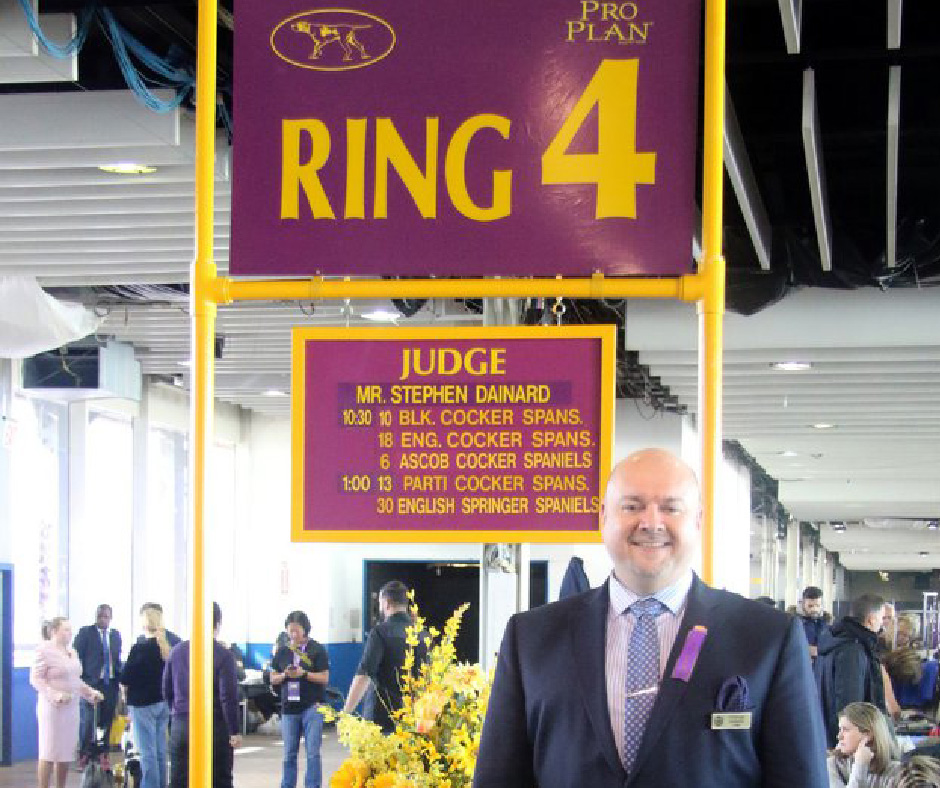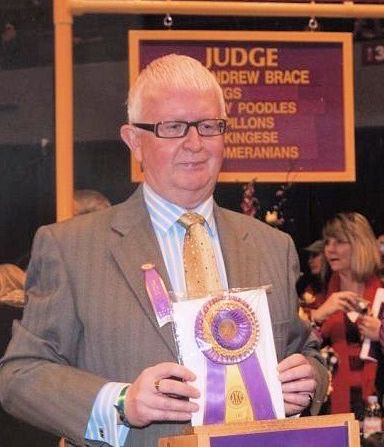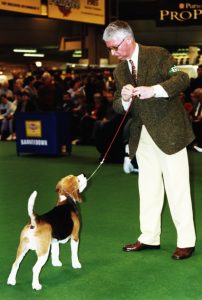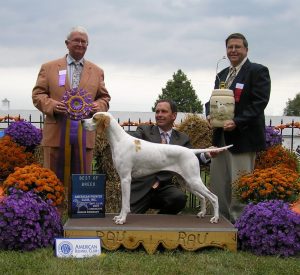608 – Dog Judging Process and Ethics with CKC Judge Steve Dainard
Dog Judging Process and Ethics with CKC Judge Steve Dainard
Host Laura Reeves is joined by Canadian Kennel Club all-breeds judge Steve Dainard for part one of their conversation about the judging approval process, judging ethics and other hot button topics as we progress through “meat and potatoes” November!
“So how do we help judges move into a place of thinking more about structure and less about the ‘paint job’,” Laura asks.
“Some of the biggest challenge is, do (judges) have that breed specific knowledge,” Dainard replies. “And are we consistent in this application? Are we judging fairly and equitably and being consistent enough so that people that are watching, and in particular breeders, can follow and they can say, this person really knows my breed?
“CKC judges get scrutiny from other non-Canadian judges about how we get there too quickly. and that maybe you know in your country, it takes it takes longer to get there. So, let’s agree that maybe somewhere in the middle might be more ideal.
“Organizing bodies do the best they can, given the current environment, to come up with a fair and equitable process. They don’t always get it right and many times changes just are just so laborious, it takes so long and really, what is the right fit. So, I understand those challenges.
“So, I think we need to work within the constraints of what we’re handed with hopefully trying to make improvements along the way. Some of those challenges are making sure we have breed specific knowledge, that we’re not missing the hallmark characteristics of a breed and just going for a more of a generic exhibit.
“If you have to ask, ‘Is there a Rule against that’, what’s happening is your moral guideline. Your compass is probably kicking in. I think you’ve already answered your question. If you have to question yourself like that, whether there’s a rule or regulation specifically forbidding that is irrelevant. You’ve already answered your question. It should not happen.
“We were raised in the sport. We spent decades in the sport. We know a lot of people. So now because we’ve chosen to change hats to now become judges, all of those relationships and those hotels we shared and vehicles we traveled in those don’t go away.
“My interpretation is that when that’s said as the reason to justify a win, my gut goes to ‘Have you really evaluated everything. Did you fairly look at the dogs in competition.’ Many times, I don’t think you’re really did that. I think that the political excuse was the easy excuse for you to justify that in your mind and poo poo the credibility of the ethical issue around the judging process.”
Episode 500!!! Celebration of Pure Dog Talk!
Episode 500!!! Celebration of Pure Dog Talk!
Welcome to Pure Dog Talk! I am your host Laura Reeves…..
These words hit the airwaves for the first time almost exactly five years ago … Five HUNDRED times later, I still have to think about my tone and cadence and inflection. Maybe just a bit less these days lol… Sort of like you guys learning to show your dog, I am entirely self-taught how to do this job and I am eternally grateful that you all have joined me in what has been a pretty incredible journey.
Today’s episode is a pure cork popping, champagne swilling celebration of our tribe. YOU guys shared some amazing stories about how this show has impacted your life in dogs. I dug around and pulled out some of MY favorite guests and interview moments.
Pure Dog Talk is not and never has been *static.* It lives and grows, often faster than I can keep up! As we move forward in the coming years, there will be changes, of course. For example, I’ll once again be podcasting *exclusively* on Pure Dog Talk. I’ve stepped waaaay outside my comfort zone and will be offering more Facebook Live and Webinar opportunities here at Pure Dog Talk (like the K9 First Aid 911 series with Marty Greer that is available on the website now) as well as moving back to more of the pre-pandemic live seminars and panel discussions over the course of the coming year.
But mostly, I wanted to say thank you. To ALL of you. My listeners, my guests, my patrons, my sponsors, my supporters and even the best compliment of all, my competitors. You have all made me better at this role than I could have ever dreamed of being. My goal of offering meaningful education, FOR FREE, to as many people in our sport as I could possibly reach has absolutely come to pass.
Thank you for taking me with you on your drives, your workouts, even your lawn mower… I am deeply honored to keep you company while you bathe, trim, condition and clean up after your dogs. Thank you for caring, so very much, about your dogs, your breeding programs and the sport of purebred dogs. Without your single-minded dedication, they would all cease to exist.
Following are just a few of the hundreds of Stories of impact from our listeners:
Diane Davis
I first heard about Pure Dog Talk when something came across FaceBook about a handler friend of mine being interviewed about the Professional Handlers Association and how to hire a professional handler to show your dog. I listened to the episode and thought it was well done, so I decided to try listening to a few more. I was pleased to discover that these were also well done and informative. I have about a forty-minute commute to work so I began to listen while driving back and forth. It wasn’t long before I got caught up on the episodes that I thought would be interesting. But as I started to go through some of the others, what I discovered was that I learned something from every episode. I began to look forward to the new episodes coming out and would listen to them several times so I didn’t miss anything.
Pure Dog Talk has become a big part of my life. I love learning about other breeds. The episode about the Bracco Italiano brought back a memory of the Bracco Axel floating around the ring to win the World Challenge Cup at Eukanuba the year I was there. I loved hearing about judges. As an owner-handler I always felt that judges were kind of unapproachable, but the interviews helped me to see that they were people too. Veterinary Voice with Dr. Marty Greer was invaluable. The episode on pyometra gave me the tools to advocate for my girl with my vet when she developed pyometra on her first heat cycle. We were able to medically manage her condition and she has since had two litters. And speaking of puppies, Pure Dog Talk has taught me a lot about breeding, whelping and raising puppies. I hadn’t bred a litter in nearly seven years because my last litter had been so hard, but with new knowledge, and new resources I have bred and raised two litters this year.
Then 2020 happened. Covid19 happened. Dog shows disappeared from the Pacific Northwest for over six months. Uncertainty about health, finances, family, friends was ever present in everyone’s life. But through it all, the Pure Dog Talk podcast was one of the few things that was stable. The Patrons “After Dark” was created so once a month we could meet via Zoom and talk about dogs, have an adult beverage and feel somewhat normal. When we had the first retreat in Montana in September 2020, we realized we had created a wonderful community of dog people and a “safe space” for everyone involved. The virtual dog shows were fun and a way to participate in some small way, a dog show. I know that I speak for other as well when I say these activities helped keep me sane during that crazy year.
As everyone in dogs knows, things are never easy. There are disappointments and body blows. There are emergencies, vet bills, money issues and just plain exhaustion. But the Pure Dog Talk podcast seems to have uncanny timing and usually is talking about a subject that I need to hear about when I need to hear it. And when I look into the eyes of my dogs, it is all worth it. I wouldn’t trade them or my life with them for anything. When you know better, you do better. Thanks Pure Dog Talk for everything you’ve given me and my dogs.
I’m Tracey Rives, Montgomery, AL, a breeder/owner/handler of Havanese dogs.. I just recently discovered your podcast “Pure Dog Talk “. Your recent podcast with Amanda Kelly, Parts 1 and 2, sparked a fire in me as an owner handler and my journey for showing dogs. It was so inspirational for me. As an owner handler I crave information in every way and your podcast is priceless in supplying great unbiased information. My goal is to encourage breeders/owners to learn to handle their own dogs. I’m afraid it’s becoming a lost art. Showing my bred-by dogs to their championship is one of the top five most gratifying things I’ve done.
MY STORY: I took my bred-by boy, Manny, (18 months old, not even a grand yet) to our Havanese National Specialty in Orlando, FL, 2016 with my buddies “Southern Magnolia Kennel Club”. Our second National. Totally no expectations whatsoever – zero, zip, nada, nothing. Really the goal was to rub shoulders with the best of the best and learn, learn, learn – not to mention drink wine and dine and fellowship with my favorite peeps. I found myself in the ring with 36 or so of the best Havanese dogs (not including bitches) in the country. Made the first cut. Wow!! Ok. Went back in. Made the second cut. Holy shit! Ok. We won the whole damn thing!!! That did not just happen. My exact words to my husband when I called him immediately after the win when apparently I should have been first in line getting our win photo. Who knew?? LOL!! By default, I opted to be the last in the photo line. Just had too many friends to hug. It’s still surreal to this day.
So the reason I’m submitting this is looking back over the last several years as a “hobby” breeder/owner/handler of Havanese, it’s really about learning to run the race gracefully. Win or lose, for me it’s about sharing my passion with my people. Because seriously, at the end of the day, without the sweet memories, it would be just another dog show.
Kayley Paylor:
I started in conformation at the request of my boy’s breeder. An Azawakh is far from the easiest dog to start with, sighthounds with guarding instincts aren’t exactly the easiest dog to convince to stand for exam. We took handling classes, debuted in the ring before the breed had been fully AKC recognized, and he took Best in Miscellaneous. We showed again a few weekends later and my boy had suddenly hit adolescence, his guarding instincts were developing, and he wanted nothing to do with the judge. We muddled along for the next two years with varying degrees of success.
During that time I have the distinct memory of having drinks with a good friend who had started showing the same weekend I had. We were taking about show dogs and she recommended a podcast called Pure Dog Talk that she’d discovered. I wasn’t really the podcast type but I decided to give it a shot. I started putting it on on the commute to work and driving to and from shows and trials.
The very first episodes I listened to were the three part Bill Shelton episodes on building a family of dogs. In the intervening time since I’d brought home my first show and performance dog, I’d added a foundation bitch who I had chosen because her pedigree complemented my boys, she had beautiful drive and focus, and her structure at 8 weeks was again complimentary to my dog’s. Listening to Bill Shelton talk about developing two bitch lines that you can work between solidified the idea I’d had bouncing around in the back of my brain of adding a second bitch. Four months later I lucked into adding a perfect second bitch from completely different lines but complimentary to my male on different ways.
Since then Pure Dog Talk has been integrally woven into my life. I travel often both for my work as a dog trainer and for shows and performance events. Over the past two years I’ve driven more miles than I care to count. Pure Dog Talk was there for all of it. I’ve listened to Dr. Marty Greer give whelping advice on my way to Open Field Coursing, I’ve listened to experts like Dr. Gayle Watkins, Bill Shelton, Dr. Teresa Nesbitt, and so many more give advice and valuable insight on a dizzying array of topics on my way to everything from Royal Canin to UKC Premier to LGRA straight racing, lure coursing, and agility trials. And through it all the one constant: Laura Reeves’ dulcet voice guiding us through preconceptions, prejudices, and recording this information for the history books.
I grew up playing team sports and having a strong community is both revitalizing to me and so useful as a sounding board. That is what Laura has built with Pure Dog Talk: a community, a tribe as she often calls it.
I can go to the patrons group with any questions and not be judged for them. I have always struggled with confidence handling my dogs in the show ring. I don’t normally have stage fright at performance events but I would just get into the show ring and shake, which of course affected my dogs. But after the mock show at last summer’s retreat where my COVID Azawakh puppy showed very well, I left the retreat finally confident that I was supporting my dogs and presenting them to the absolute best of my ability. And when my car failed at the patrons get together this March, Laura graciously made room for my dogs so they didn’t have to sit in the cold car while I waited for a tow truck. That is what true community is about. That is how we keep people new to our sport around.
In many ways Pure Dog has been an instrumental resource for me over the last couple of years, not just for the handling tips but also the whelping information as I get ready to whelp my first litter. Pure Dog Talk is an invaluable resource for the purebred dog community and I’m eternally grateful to Laura for undertaking this podcast and for other listeners and patrons for supporting it and helping it become the resource it is today.
Christina Rozema
I wanted to give you another thank you update. Your podcast supported me showing my bull terrier bitch Freyja and with the wackiness of 2020 she became the top Bull Terrier in Canada. Sure there were ‘t many shows but there weren’t many for everybody equally. Then as I binge listened time-out breeding podcasts with Dr Greer and with Avidog, I planned her breeding with frozen semen imported from Poland to an amazingly successful litter of 11 who are now 3 weeks old.
You helped me build my courage, keep up my spirits, and feel confident enough to go ahead with her breeding.
Thank you thank you thank you. You have made such a difference in my life and the life of my dogs. I just wanted you to know.
Feedback from you guys gives me courage when things are tough to keep going. I am so grateful for our tribe.
So now, just a few comments from some of MY favorite guests and conversations over the last five years….
…..
There are so many more moments, episodes and conversations to be had. Watch this space! The next five years are guaranteed to be chockablock with knowledge shared.
196 – “Bracing” Talk: Pedigrees, Critiques and Skill
Andrew Brace on Pedigrees, Critiques and Skillful Handlers
In the third and final installment of my interview with international dogman Andrew Brace, he shared his knowledge on reading pedigrees, writing judge’s critiques and the definition of expert presentation in a wide-ranging and brutally honest discussion.
Our conversation also touched on the influence of animal rights extremism on the UK’s “high profile breeds” vet checks. Brace additionally noted the correlation between health issues in our breeds and the increasing tendency for breeders to “take Mother Nature’s job from her.”
Andrew Brace last showed a dog at Crufts 2000 when he retired having handled his BIS winning Beagle, UK Ch Dialynne Tolliver of Tragband.
Breed the best to the best to get the best
“Dedicated breeders are constantly aiming to improve their stock,” Brace said. “Those breeders who think breeding a winner is simply a matter of mating a winning bitch to a winning dog fail to realize the value and implications of the pedigree and do not understand what a valuable breeding tool this is.
“You need to be able to read a pedigree. This is where the truly great breeders score. The pedigree supplies valuable information – provided the reader has researched the dogs who appear in it. (Master) breeders study a pedigree of at least five generations. If they don’t know all the dogs in it personally, they’ll research them by seeking out photographs or simply asking older breeders who are still around exactly where these dogs scored and failed.
“In this way they build up a comprehensive picture of their dog’s ancestry. They will, over a period of time, be able to assess what faults and virtues lie behind their breeding stock. And, perhaps more importantly, establish which dogs were responsible for producing them,” Brace said.
“Correct is not produced by mating two extremes,” Brace added. “A potential parent who lacks in one area should be mated to a dog that excels in that failing. A dog that’s slightly straight behind will not produce perfect rear angulation by mating it to a dog that is hopelessly over angulated. Its chosen mate should have correct angulation.”
“Winning” dog is not always the same as “best” dog
“We have focused on show dogs,” Brace said. “In many breeds, this has meant that dogs that are perhaps a little exaggerated in one way or another have taken the eye of the judge over the dogs who are maybe more correctly balanced or constructed because they have a little sense of drama about them.
“It is our responsibility as judges to reward the correct dog over those dogs that have probably won a ton of best in shows by virtue of the fact that they fly around the ring with their long necks, gay tails and dripping in hair.”
Useful written critiques
“When writing critiques, I think it’s essential to detail the dog’s outstanding virtues but also mention any obvious shortcomings, which can always be done tactfully,” Brace said. “For example, ‘Head like a bucket’ and ‘prefer a cleaner backskull’ – they mean the same thing, but one is more palatable. It isn’t necessary to describe the dog from head to tail but, concentrate major pluses and minuses.”
Listen to renowned judge Ginny Lyne on this topic.
Merge into the background
Andrew Brace judging the American Pointer Club 2007 National Specialty. BOB Ch Cookieland Seasyde Hollyberry, handled by Michael Scott.
“It is little wonder that some of your most successful handlers go on to become outstanding judges,” Brace noted. “The thought process is exactly the same. Handling is the art of emphasizing a dog’s virtues whilst disguising its faults. Judging is all about recognizing the virtues yet getting the faults into perspective.
“Some countries, unfortunately, have produced some so-called professional handlers who have clearly watched a lot of American videos, bought some flashy jackets and race around the ring with dogs of indeterminate quality. They often carry too many dogs to do justice to and its obvious they aren’t kept in the best of conditions. These are the guys that are just doing it to make a buck. They aren’t handlers as I understand the word.
“The best handlers are those who are so skillfully unobtrusive that they just seem to merge into the background. These experts have the ability to project the dog to the judge at first sight,” Brace added.





